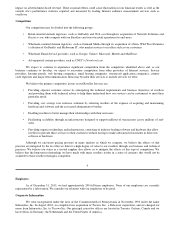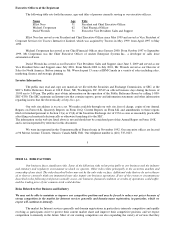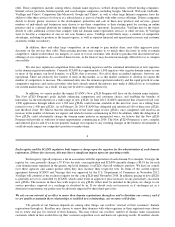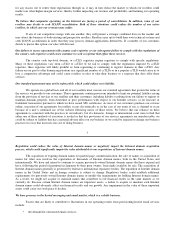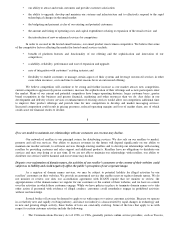Tucows 2013 Annual Report Download - page 17
Download and view the complete annual report
Please find page 17 of the 2013 Tucows annual report below. You can navigate through the pages in the report by either clicking on the pages listed below, or by using the keyword search tool below to find specific information within the annual report.
particular case at issue. Our ability to monitor, censor or otherwise restrict the types of data or content distributed through our
network is limited. Failure to comply with any applicable laws or regulations in particular jurisdictions could result in fines,
penalties or the suspension or termination of our services in these jurisdictions. Our insurance may not be adequate to
compensate or may not cover us at all in the event we incur liability for damages due to data and content carried on or
disseminated through our network. Any costs not covered by insurance that are incurred as a result of this liability or alleged
liability, including any damages awarded and costs of litigation, could harm our business and prospects.
Privacy concerns relating to our technology could damage our reputation and deter current and potential users from
using our services.
From time to time, concerns have been expressed about whether our services compromise the privacy of our users
and others. Concerns about our practices with regard to the collection, use, disclosure or security of personal information or
other privacy-related matters, even if unfounded, could damage our reputation and operating results and expose us to
litigation and possible liability, including claims for unauthorized purchases with credit card information, impersonation, or
fraud claims and other claims relating to the misuse of personal information and unauthorized marketing purposes. While we
strive to comply with all applicable data protection laws and regulations, as well as our own privacy policies, any failure or
perceived failure to comply may result in proceedings or actions against us by government entities or others, which could
potentially have an adverse effect on our business.
14
In addition, due to the fact that our services are web based, the amount of data we store for our users on our servers
(including personal information) has been increasing. Any systems failure or compromise of our security that results in the
release of our users’ data could seriously limit the adoption of our services as well as harm our reputation and brand and,
therefore, our business. We may also need to expend significant resources to protect against security breaches. The risk that
these types of events could seriously harm our business is likely to increase as we expand the number of Internet services we
offer.
A large number of legislative proposals pending before the United States Congress, various state legislative bodies
and foreign governments concern data protection. In addition, the interpretation and application of data protection laws in
Europe and elsewhere are still unsettled. We cannot guarantee that our current information-collection procedures and
disclosure policies will be found to be in compliance with existing or future laws or regulations. If our policies and
procedures are found not to be in compliance, in addition to the possibility of fines, this could result in an order requiring that
we change our data practices, which could in turn have a material effect on our business. Complying with these various laws
could cause us to incur substantial costs or require us to change our business practices in a manner adverse to our business.
We are participating in ICANN's new gTLD Program that was approved in June 2011, which may present us with unique
operational and other risks. If we are unsuccessful in managing these risks, our business, financial condition and results
of operations could be adversely affected.
We are still participating in ICANN’s New gTLD program to own and/or operate New gTLD strings. In March
2013, we entered into an alliance with Directi and Namecheap to jointly work together to manage the contested .online
registry. In addition, as part of a series of private arrangements that were completed in July 2013, we have exchanged a
majority interest in our contested .group application for a minority stake in two other contested new gTLD strings, .tech and
.store. While there can be no assurance that we will be awarded any gTLDs, we intend to continue to pursue contested gTLD
operator rights and in order to prevail, may incur significant additional costs to acquire such rights. When more than one
party applies for a gTLD, the parties are typically required to enter into negotiations or participate in an auction to win the
registry rights. We may be outbid or otherwise unsuccessful in acquiring gTLDs in these negotiations or auctions. We could
also face lawsuits or other opposition to our gTLD applications or any award of gTLD operator rights.
In addition, we currently have no operating experience providing back-end registry services to existing registries or
acting as an owner and operator of domain name registries for gTLD strings. Our participation in the new gTLD program
may involve us in new and complex processes with respect to the application and awarding of gTLD strings by ICANN,
which may require that we expend significant resources to integrate these processes into our current operations. Participation
in the new program may also require us to rely upon, negotiate and collaborate with independent third parties, with whom we
may not have long-term contracts. In addition, we expect to compete with other established and more experienced operators
in these proposed service offerings and may not be able to compete effectively with these operators. If we are unsuccessful in
managing these risks, our business, financial condition and results of operations could be adversely affected.
Because we are required to recognize revenue for our services over the term of the applicable customer agreement,
changes in our sales may not be immediately reflected in our operating results.


